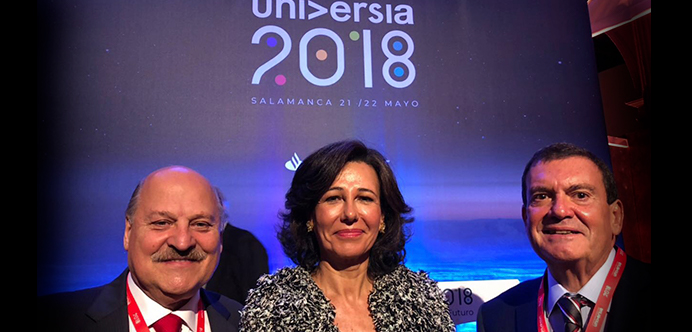
Salamanca is the international epicenter of education with the IV Universia International Rectors’ Meeting, and the Practicum Foundation dresses up to attend. Our president, Prof. Dr. Eduardo Hornos, is one of the more than seven hundred academic representatives and personalities of politics and business invited to this symposium, held at the University of Salamanca, under the motto "University, Society, and Future."
Salamanca – May 21, 2018. The Practicum Foundation participates in the debate Universia 2018, held at the University of Salamanca between May 20 and 22, coinciding with the celebration of the eighth centenary of the center. Under the slogan "University, Society, and Future, more than seven hundred experts from twenty-six countries will delve into the keys of the university of the present and the immediate tomorrow. The conclusions of the debate will be reflected in the “Declaration of Salamanca,” with the commitment of the authorities and assistant rectors so that the academy progresses in consonance with the needs of the society.
The IV Universia International Rectors’ Meeting was inaugurated today, Monday, May 21 by His Majesty King Don Felipe and the President of the Republic of Portugal, Marcelo Rebelo de Sousa. They were accompanied by, among other notables, the Secretary-General of the OECD, Ángel Gurría, and the president of Universia and Banco Santander, Ana Botín, who poses in the image along with Prof. Dr. Eduardo Hornos, president of the Practicum Foundation, and Héctor Masoero, president of the Universidad Argentina de la Empresa (UADE). Prof. Dr. Hornos stressed that "there will be two days devoted to the debate about the role of the university in the 21st century and this occasion will also bring an opportunity to generate cooperation agreements."
The meeting will be developed in three thematic axes of special interest for the academic world: "Forming and learning in a digital world"; "Investigating in the University, a paradigm in review?" and "The contribution of the university to social and territorial development." Among the speakers, eminent figures stand out, such as Pam Fredman, president of the International University Association, María José Alonso, a professor at the University of Santiago de Compostela, and Anant Argawal, professor of Electrical Engineering and Computer Science at MIT and CEO of edXOnline.
The symposium will give continuity to the meetings that took place in Rio de Janeiro (Brazil, 2014), Guadalajara (Mexico, 2010), and Seville (Spain, 2005), and is supported by Banco Santander, the company that most invest in education worldwide, according to the Varkey/UNESCO-Fortune 500 report. The microbiologist, researcher, and professor at the University of Alicante, Francis Mojica, known worldwide for his research in genomics related to the mechanisms of immunity in prokaryotic cells, will deliver the closing conference of this meeting, which will end on May 22 with an act presided over by Botín, accompanied by the President of the Government of Spain, Mariano Rajoy.
Promoting research
A survey carried out among more than nine thousand university students from nineteen countries reveals that more than half of the university community (56%) consider necessary to improve both the facilities and the resources allocated to research within the university, while 35% understands the lack of funds and funding as the main barrier to boost research work. On the other hand, a third of those interviewed believe that enhancing the research dimension should be one of the main priorities of the university, before other issues such as the digitization of formal education.
For those interviewed, one of the primary objectives of the university should be the promotion of research, development, and innovation tasks. A goal that, according to 46% of the respondents, is not covered satisfactorily. In fact, 61% of the respondents believe that their university focuses almost exclusively on teaching, 25% consider the prioritization of research as minimal, and 21% think that the university is not providing them sufficient foundation to become good researchers. Another noteworthy fact is that 15% of the undergraduate students plan to dedicate to research at the university.
Our personalized help center enables you to obtain technical support and help for navigating through the site and using the program.